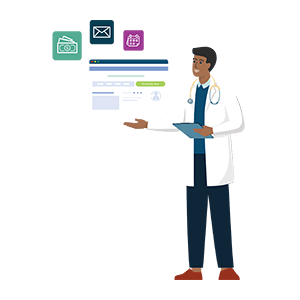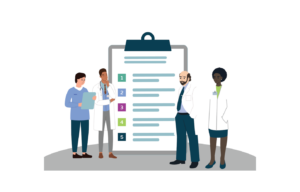3 Effective Communication Strategies for Healthcare Practices

By Chloe From Clearwave | June 5, 2023
Effective communication is a critical component of successful healthcare practices. In today’s fast-paced healthcare environment, it’s more important than ever for healthcare practices to adopt the latest communication tools and strategies to stay ahead of the competition. Learn the importance of effective communication in healthcare and three strategies that healthcare practices can use to improve patient communication, revenue collection and engagement!
The Importance of Effective Communication in Healthcare
Effective communication is a vital component of healthcare, as it plays a significant role in establishing and maintaining trust between healthcare providers and patients. Healthcare professionals need to communicate effectively with patients to ensure that they understand their medical results or treatment plans and know when to come back in for their next appointment. Communication breakdowns can result in lapsed patients, appointment gaps and patients who feel disconnected from their healthcare providers.
Effective communication is crucial in today’s healthcare landscape because patients have more access to health information than ever before. Due to the expanding wealth of knowledge readily available and searchable online, patient expectations have changed. Leading them to expect faster communication, streamlined service and immediate answers from their healthcare providers.
Healthcare professionals must communicate effectively to ensure patients have accurate and reliable information about their health and upcoming appointments. Effective communication can help healthcare practices build stronger relationships with patients, leading to better patient outcomes and increased loyalty. According to a recent study, a staggering 89% of adults in the United States consider “Ease of Access” a crucial aspect when selecting healthcare providers.
Patients who feel like their healthcare providers are easy to communicate with demonstrate a higher likelihood of adhering to treatment plans and returning to the practice. As a result, high-growth practices are finding automated and efficient ways to establish accessible communication strategies.
Here are 3 strategies they’re focused on.
1. Automated Recalls
Automated recalls are an increasingly popular communication strategy used by healthcare practices to improve patient communication. A recall is a message that’s sent to a patient to let them know it’s time to schedule their next appointment. These automated messages can be sent via voice, text or email, to ensure patients receive a notification in their preferred method. Furthermore, they can be customized to match the tone and voice of the practice and provide a link to make it simple for the patient to book their appointment in minutes. For example, a recall message may say: “It’s time to schedule your annual appointment, book here!”
One of the primary benefits of automated recalls is that they help reduce the number of lapsed patients, helping practices drive consistent revenue and continue to increase the lifetime value of their patient base while keeping those patients on track with their healthcare needs. Automated recalls also free up staff time that would otherwise be spent manually calling patients to schedule their next appointment. With just this one time-consuming task off your staff’s to-do list, they can focus on other high-value actions like patient care and billing. Furthermore, this tool can maximize physicians’ schedules by increasing the likelihood of filling any available appointment slots.
How it works:
With patient recalls, once a patient completes their initial check-in, they will be seamlessly enrolled in a recall cadence. The cadence can be pre-determined by your practice based on appointment type, to help you automatically send recalls at the right follow-up time. This method ensures your practice remains at the forefront of your patients’ minds when it comes time to book future appointments. By incorporating a streamlined process, patients can effortlessly schedule their next visit right after receiving a recall, thanks to the inclusion of a phone number and scheduling link in the message. This approach prioritizes convenience and simplicity, allowing patients to promptly secure their follow-up appointments and your practice to secure consistent patient bookings.
An automated recall tool can also improve patient satisfaction by providing patients with timely and convenient ways to keep their well-care visits top of mind and book their next appointment with ease. Automated recalls can help healthcare practices ensure that patients receive timely and appropriate care, reducing the risk of adverse outcomes.
2. Appointment Reminders
Appointment reminders are an essential communication strategy used by healthcare practices to improve patient communication and reduce missed appointments. In today’s fast-paced world, patients are often juggling multiple commitments and may forget about their appointments without proper reminders.
How it works:
Healthcare practices can use a variety of methods to send appointment reminders to patients, including automated voice calls, text messages and email notification methods. Appointment reminder messages can be easily customized based on appointment type or patient preferences. This customization allows you the control to only send messages via your patient’s preferred notification method, or to send multiple reminders on separate days or even on the same day as the appointment. Choose an appointment reminder solution that also lets you customize the messages, add your logo, adjust the text, add in links to confirm or modify appointments, and even enable patients to complete pre-check in the same step. Smart appointment reminder solutions will also enable practices to adjust patient arrival time settings, to ensure you get patients into the office at the most optimal time.
Appointment reminders offer a multitude of advantages, with a key benefit being the reduction in missed appointments, which also helps mitigate potential consequences such as care delays. By leveraging appointment reminders effectively, healthcare practices can reduce the number of no-shows, to fully maximize physician schedules and increase realized revenue.
With the help of links provided in the reminders, patients can conveniently confirm their appointments or make modifications if required. This step helps you streamline in-office registration and see patients sooner.
Considering 49% of patients want the ability to check in or complete health forms before arriving, pre-check is a step your patients are starting to require as well. By completing clinical intake tasks in advance, patients can reduce wait times at the practice, leading to improved patient satisfaction and throughput.
However, your ability to drop your no-show rate heavily relies on your reminder strategy, some approaches work better than others. Use a strategy that’s proven to drop no-shows, to the point where your physicians take notice!
Learn more about how to use patient reminders to help reduce no-shows in this on-demand webinar on “No Room for No Shows.” Additionally, you can see how Alabama Ophthalmology Associates (AOA) implemented a new reminders solution and tailored strategy to reduce missed appointments to the point where physicians and nurses took notice.
3. Two-Way Texting
Integrating two-way texting into your practice’s communication strategies can help you revolutionize practice-to-patient interactions. This tool enables seamless and private communication between healthcare providers and patients, offering a convenient and easily accessible channel for both parties.
How it works:
With a two-way-texting tool, you can send focused, efficient messaging to your patients to streamline communication and deliver a better patient experience.
Use our patient texting software to easily chat with patients or send templated responses. Provide instructions, send alerts or advise companions of completed procedures. Ensure you find a tool that enables this communication, without patients needing to log in to a portal or app, to make patient access simple and effective.
By streamlining communication, two-way texting reduces reliance on time-consuming phone calls and voicemails, optimizing practice operations and freeing up staff hours. This digital transformation empowers healthcare providers to focus on critical tasks.
The integration of two-way texting enhances patient engagement, catering to their preference for text message communication. Integrating two-way texting into practice communications not only enhances the patient experience, boosts efficiency, and fosters stronger patient-provider relationships but also improves patient engagement and outcomes through convenient and personalized communication.
Elevate Your Communication Strategies
In today’s fast-paced healthcare environment, effective communication strategies are critical to improving patient outcomes and satisfaction, while driving patient acquisition and retention. To drive success, high-growth healthcare practices must ensure that they are using the latest communication tools and strategies to stay ahead of the competition.
Clearwave offers a range of patient communication solutions, purpose-built to help healthcare practices bring in more patients on time and keep them in the loop about key practice announcements or patient requirements. From automated recalls and appointment reminders to two-way texting, Clearwave’s solutions are designed to improve patient engagement and outcomes while streamlining communication processes. By partnering with Clearwave, healthcare practices can improve patient communication, reduce no-shows and lapsed patients, speed up throughput and ultimately increase revenue growth. With Clearwave’s help, healthcare practices can stay ahead of the competition and provide patients with the communication tools and strategies they need to manage their healthcare effectively.
Are you ready to revitalize your healthcare practice’s communication strategies? Learn more about how Clearwave can help improve communications at your practice by downloading our communications data sheet!
Recommended for you
Related Posts
From Click to Care: 3 Ways to Increase Patient Acquisition at Lower Costs
Reading Time: 3 minutesBy Blakely Roth | March 12, 2025 In today’s competitive healthcare environment, specialty practices must find innovative ways to attract…
Clearwave Announces 2024 clearwaveCup Winners, Celebrating Excellence in Patient Engagement
Reading Time: 3 minutesATLANTA – February 25, 2025 – Clearwave, the patient-led self-service solution provider, is proud to announce the recipients of the…
Top 2 Trends Impacting Orthopedic Practices & Patients in 2025
Reading Time: 5 minutesBy Chloe From Clearwave | February 20, 2025 In 2025, orthopedic practices face the dual challenge of integrating high-cost technologies…




